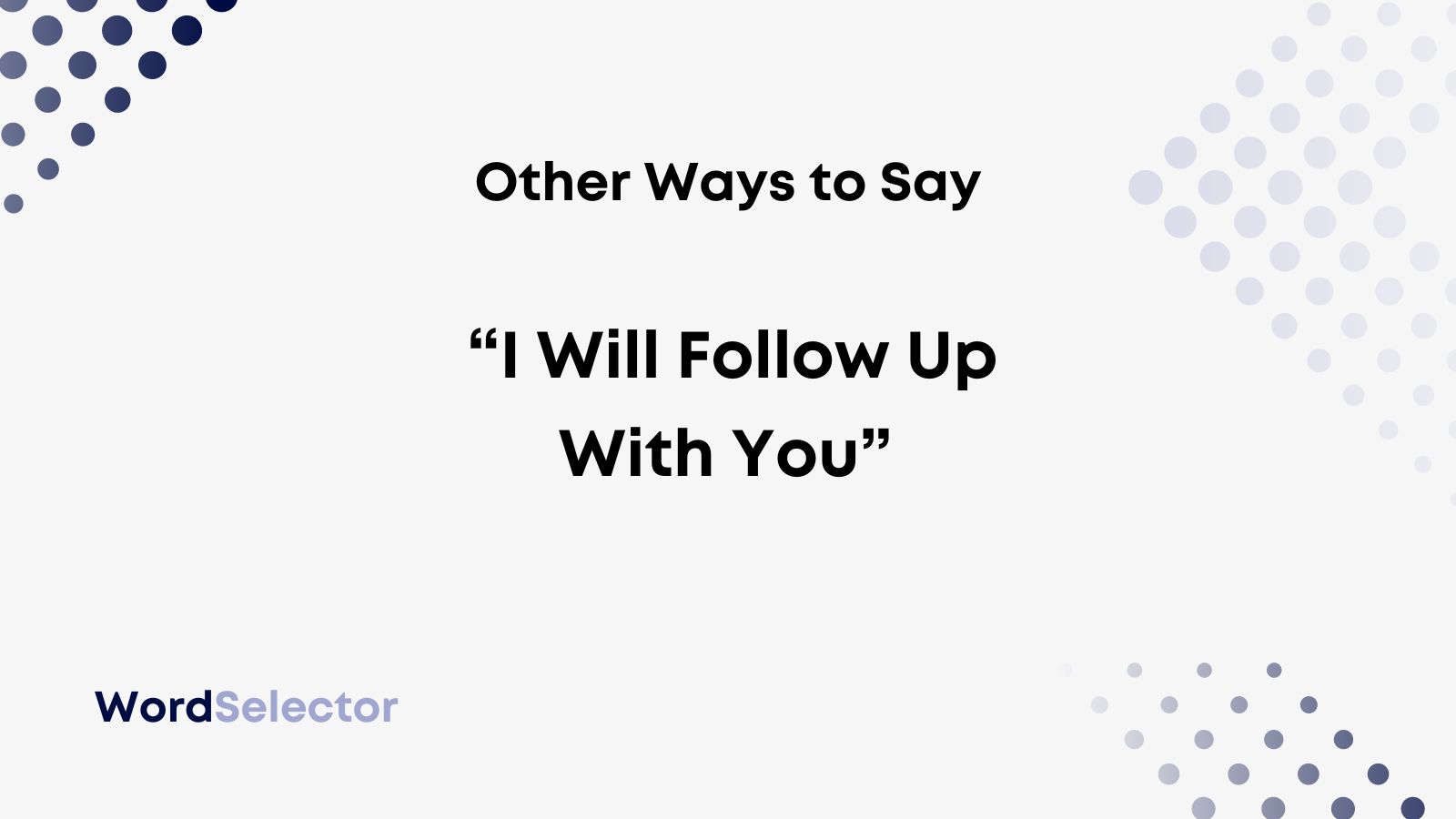Are you not quite ready to provide information to someone, as you’re worried you don’t have all the facts? Well, you should let someone know that you’ll follow up with them soon, but not yet!
That’s where “I will follow up with you” comes in. You can use it to tell someone that you’ll get back to them later.
However, it’s not the only phrase that works. This article has gathered some great synonyms to help you with it.
Other Ways to Say “I Will Follow Up With You”
- I plan on keeping you informed
- Let me get back to you
- I’ll be in touch
- I’ll keep you informed
- I’ll provide updates
- We’ll circle back
- I’ll check in with you later
- I’ll touch base with you
- I’ll reach out later
- I’ll keep tabs on this and let you know
KEY TAKEAWAYS
- “I will follow up with you” is correct and shows you plan to reach out to someone when you have more information.
- “I plan on keeping you informed” is a great professional alternative that’ll help you mix things up.
- Try “let me get back to you” as a more informal synonym when writing to coworkers.
You should read on to find out more about how to say “I will follow up with you” in an email. We’ve provided a heading for the best formal and informal options.
Also, the final section will explain whether it’s correct to say “I will follow up with you.” You can skip ahead if you’re interested in learning more about the phrase.
I Plan on Keeping You Informed (Formal)
You can write “I plan on keeping you informed” as a formal synonym. It works well in place of “I will follow up with you” because it shares your intention about keeping someone updated.
Also, saying “I plan on” makes this phrase more confident. It shows you’re in control of the situation and will happily share updates with someone as soon as they come through.
Generally, this works well when emailing your boss. It shows you are working on a more private project, but you’re happy to keep them in the loop.
It lets your boss know that you have the situation under control. This is good for their peace of mind, and it’ll remind them that you’re a trustworthy employee when it counts.
We also recommend this email example if you’re still stumped:
Dear Miss Partridge,
I plan on keeping you informed, so please leave it with me. I will reply as soon as I have more information that’s relevant to this.
Best regards,
Daniel Cole
Let Me Get Back to You (Informal)
Another way to say “I will follow up with you” is “let me get back to you.” It’s a great informal option that shows you will reply with an update soon.
We recommend including this when messaging colleagues. It shows you’re working closely with others in the workplace and will provide them with an update when you have relevant information.
For example, you might frequently meet your boss to discuss changes in the workplace. You can share the discussions during these meetings with colleagues who might be out of the loop.
It’s a great way to keep your colleagues involved, even if they’re not meant to be. It shows you respect them enough to share the information with them.
If you’re still unsure, feel free to refer to the following email sample:
Hi Marie,
Let me get back to you on this. I’m not sure what the answer is, but I’m certain I’ll find out over the next couple of days.
Yours,
Steven Anderson
Is It Correct to Say “I Will Follow Up With You”?
It is correct to say “I will follow up with you.” It’s a useful way to show you plan on getting back to someone.
We recommend using it when emailing clients. It shows you plan on following up, but you don’t know precisely when you’ll have more information for them.
“Follow up” should always be written as two words in this context. It’s a phrasal verb, so you should leave it separated.
It’s a common misconception to think you need to hyphenate “follow-up” when written in this way.
Check out the following to help you understand it:
- Correct: I will follow up with you.
- Correct: This is a follow-up email.
You can also use either of these variations:
- I will follow back up with you
- I will be following up with you
And it’s worth exploring these extensions to keep your writing unique:
- I will follow up with you shortly
- I will follow up with you tomorrow
- I will follow up with you next week
- I will follow up with you later
- I will follow up with you once it’s completed
These extensions allow you to be a bit more specific about when you will follow up. It’s a great way to keep the recipient in the know about when you’re going to reach out.

